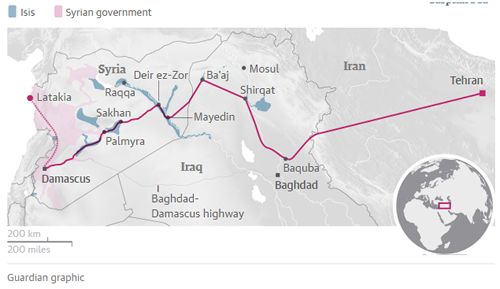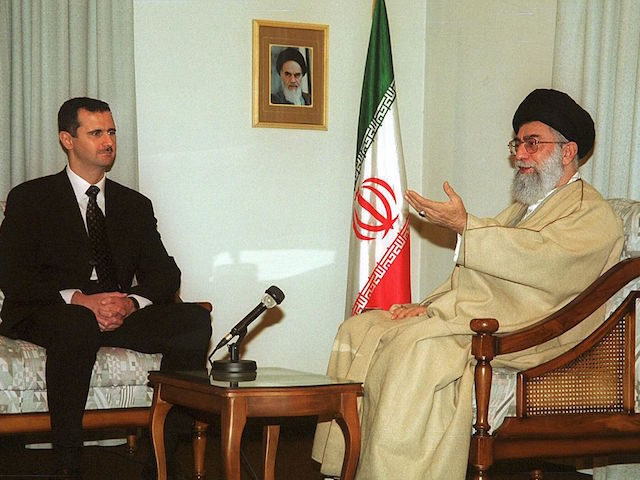This morning’s key headlines from GenerationalDynamics.com
- Iran scores strategic victory in Syria with land route from Tehran to Mediterranean
- Russia warns US that its jets in western Syria will be treated as targets
Iran scores strategic victory in Syria with land route from Tehran to Mediterranean

Iran’s land route from Tehran to Mediterranean Sea, through Baghdad and Damascus (Guardian)
According to several reports, Iran has scored a major military victory in the last few days by taking control of villages on the Iraq-Syrian border in Deir az-Zour, and thus able to claim that they have control of an entire route, or land bridge, connecting Tehran to the Mediterranean Sea. The villages had been controlled by the so-called Islamic State (IS or ISIS or ISIL or Daesh), and they were recaptured by Syrian army forces in conjunction with the military operations to expel ISIS from Raqqa.
As we reported two weeks ago, the U.S. and Iran were headed for a military confrontation in Deir az-Zour, as they competed to take control of the region in eastern Syria freed up by the expulsion of ISIS. But apparently, the achievement caught the West by surprise. The Iraqi army’s Iran-trained Popular Mobilization Units (PMUs) raced from Mosul in Iraq to the Syrian border just as Syrian army divisions reached the same border crossing earlier this month, according to a pre-arranged plan between Iran and the Syrian regime. This gave Iran control of the border crossing before coalition forces could react.
This so-called land bridge is a lengthy, meandering 1,100 land route through Iraq and Syria, as can be seen from the map above, and there is a lot of skepticism that Iran controls the entire route in any certain sense. So far as is known, no attempt has yet been made to make use of the land route. Furthermore, even if Iran does control the entire route, any convoys would be vulnerable to U.S. or Israeli airstrikes.
However, if the land bridge claim turns out to be true, it would be a significant strategic victory for Iran, because it would permit Iran to supply its allies in Lebanon and Syria with weapons and rockets.
In light of this strategy, Iran’s launch of seven missiles into ISIS targets in Deir az-Zour, that we reported yesterday, can be seen as having the two purposes: First to support the capture of ISIS territory needed for the land bridge, and second to warn Saudi Arabia, Jordan and Israel not to interfere, as the next missiles could be launched in their direction.
This is not the end of the story. Americans, Russians, regime Syrians, free Syrians, Kurds, Hezbollah, and Iranians have all been united in fight against ISIS in Raqqa and Mosul. Al Monitor and Al Araby (9-June) and New Yorker and News Deeply (8-June)
Related Articles
- US and Iran headed for military confrontation in Deir az-Zour in eastern Syria (09-Jun-2017)
- Israel and Syria have unprecedented missile clash over Jordan (19-Mar-2017)
- US and Iran-backed troops head for confrontation at al-Tanf on Iraq-Syria border (05-Jun-2017)
- US warplanes strike Syrian regime military convoy near al-Tanf base (19-May-2017)
Russia warns U.S. that its jets in western Syria will be treated as targets
Russia is demanding a full accounting from the United States military on why it was necessary for the U.S. military to shoot down a Syrian regime Su-22 bomber on Sunday. As we reported yesterday, the U.S. issued a lengthy statement explaining that the Syrian warplane was targeting Syrian Democratic Forces (SDF) that are supported by the U.S. in the military operation to recapture Raqqa from ISIS.
The Russian Defense Ministry said in a statement that all coalition jets and drones flying west of the Euphrates River will be tracked as potential targets:
Any aircraft, including planes and drones belonging to the international coalition operating west of the Euphrates River will be tracked by Russian anti-aircraft forces in the sky and on the ground and treated as targets.
The Pentagon statement that we quoted yesterday said that “the Coalition contacted its Russian counterparts by telephone via an established ‘de-confliction line’ to de-escalate the situation and stop the firing,” referring to a hotline set up months ago between the US and Russia to prevent accidental or unintended military clashes. On Monday, Russia threatened to discontinue the de-confliction line, although reports at the end of the day indicated that it was still working.
There is a possibility that Russia is making threats for the benefit of its Syrian and Iranian clients, but does not intend to follow through on them, though this is not known if true.
As I’ve written many times, Generational Dynamics predicts that the Mideast is headed for a major regional war, pitting Sunnis versus Shias, Jews versus Arabs, and various ethnic groups against each other. Generational Dynamics predicts that in the approaching Clash of Civilizations world war, the “axis” of China, Pakistan and the Sunni Muslim countries will be pitted against the “allies,” the US, India, Russia and Iran. Military Times and The Hill and Debka
Related Articles
- US shoots down Syrian warplane, as Iran launches missiles into Syria (19-Jun-2017)
- Russia’s policies thrown into confusion as US resumes its ‘world policeman’ role (09-Apr-2017)
- Jordan on alert as ISIS captures more Iraq border towns (23-Jun-2014)
KEYS: Generational Dynamics, Iran, Iraq, Syria, Deir az-Zour, Islamic State / of Iraq and Syria/Sham/the Levant, IS, ISIS, ISIL, Daesh, Syrian Democratic Forces, SDF, Raqqa, Mosul, Russia, De-confliction line
Permanent web link to this article
Receive daily World View columns by e-mail

COMMENTS
Please let us know if you're having issues with commenting.